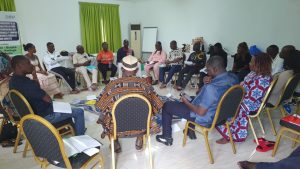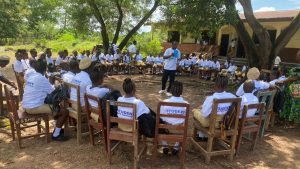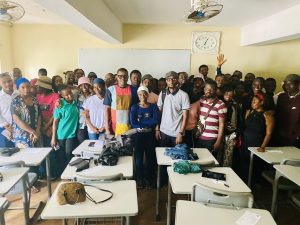“The ATJLF project has been a blessing to us. The Salmande community in the past few years had become a conflict-prone area where women fight each other, and our youth were constantly engaged in gang violence and theft. We thank God for this project, it has really brought relief to our community. I have been empowered on how to handle conflict among us the market women in the Salmanda community…”
ATJLF supported the West Africa Network for Peacebuilding (WANEP) to implement community engagements for women and women-led community CSOs in Sierra Leone. This engagement which mainly targeted mammy queens (chairladies), market women, and women-led CSOs promoted peace and peaceful cohesion in the host communities. The engagement also focused on additional issues relating to the conduct and the role of community members in ensuring that they promote social cohesion before, during, and after electoral processes. As a result of this intervention, the women were sufficiently empowered to lead the promotion of peace and social cohesion in their respective markets.
This engagement significantly improved the skills of women litigators who have started resolving and mediating conflicts in the marketplaces which has helped to reduce the number of cases that goes to the court. This achievement further ensured women are able save monies that would have been spent on court cases and they are now more collaborative as communities.
According to a baseline study conducted by the implementing partner in focal communities, the project has caused a positive change in the perceptions of traditional leaders and local authorities towards women’s inclusion and leadership. Women are now seen as key partners in development and are now including in decision-making in their communities.
The project further strengthened the local redress mechanism structures for solving conflict in the communities. Thanks to the formation of traditional justice monitoring committee in two districts, members of the committees are now able to conduct conflict prevention sessions that helps to reduce the level of violence and promote justice through the Alternative Dispute Resolution Mechanisms. With complimentary projects from ATJLF-funded Famboul Tok in other parts of the country, Sierra Leone is on the path to social cohesion and increased accountability.
The foregoing has led to increased progress in the narrative change around transitional justice and its effects on the development across Sierra Leone through various awareness raising engagements. The project has therefore been an effective component for the dispensation of justice, promotion of peace and social cohesion across Sierra Leone.



